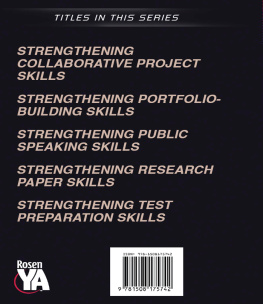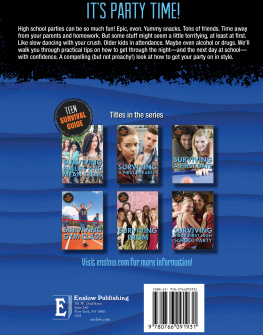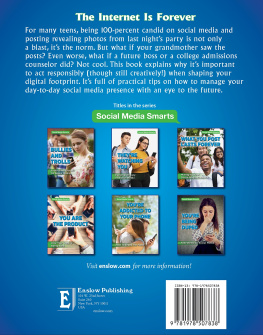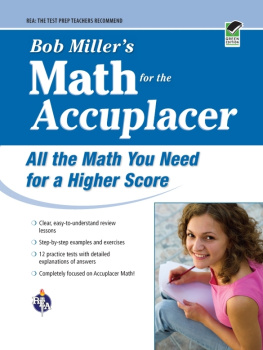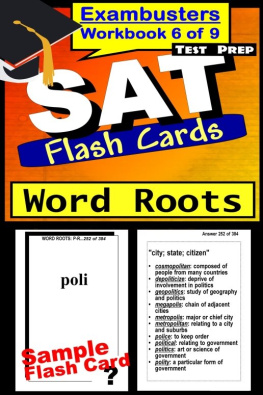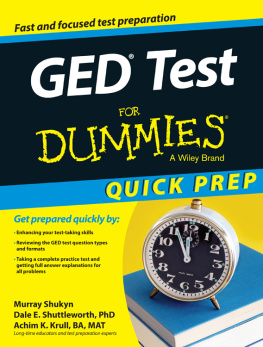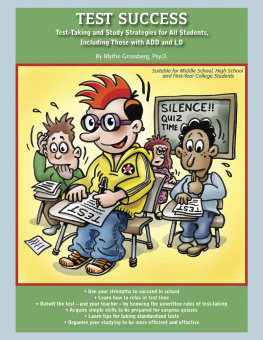Published in 2018 by The Rosen Publishing Group, Inc.
29 East 21st Street, New York, NY 10010
Copyright 2018 by The Rosen Publishing Group, Inc.
First Edition
All rights reserved. No part of this book may be reproduced in any form without permission in writing from the publisher, except by a reviewer.
Library of Congress Cataloging-in-Publication Data
Names: Burling, Alexis, author.
Title: Strengthening test preparation skills / Alexis Burling.
Description: New York, NY: Rosen Publishing, 2018. | Series: Skills for success | Includes bibliographical references and index.
Identifiers: LCCN 2016053793 | ISBN 9781508175742 (library bound)
Subjects: LCSH: Test-taking skillsJuvenile literature. | Study skillsJuvenile literature.
Classification: LCC LB3060.57.B86 2017 | DDC 371.26dc23
LC record available at https://lccn.loc.gov/2016053793
Manufactured in the United States of America
CONTENTS
Introduction
CHAPTER ONE
Know Thyself
CHAPTER TWO
Lights, Camera, Action
CHAPTER THREE
Asking for Help
CHAPTER FOUR
Its Test Time
CHAPTER FIVE
Be Your Own Boss
Glossary
For More Information
For Further Reading
Bibliography
Index
INTRODUCTION
L ets be honest. In most situations, taking tests isnt exactly fun. Sure, staying up late to finish a gripping novel for English class or listening to a fascinating lecture about Japanese history are both engaging activities. But taking a quiz on the material the next morning? That can be downright stressful.
The notes you took in class need interpreting and there are flashcards to make. Memorizing facts, figures, and important dates can sometimes take hours, if not days. Getting a good night sleep and balancing study time with homework is tricky, especially when youd rather be hanging out with friends.
On top of all that, theres the anxiety that comes with actually taking the test. Finishing a multiple-choice exam on time and answering all the questions is essential. So is remembering to express your thoughts clearly and confidently in short-answer questions and essays. But learning how to master these skills isnt impossible. In fact, with just a few adjustments to your daily routine, you can become a test-taking whiz in no time. All it takes is just a little practiceand a heaping spoonful of patience.
In this resource, youll be introduced to a variety of ideas about test-taking habits. Somesuch as noticing and owning up to your weaknessesmight seem uncomfortable in the beginning. After all, maybe youre not aware that analogies and algebra problems arent your strong suit. Coming to terms with your limitations is a difficult process. But it is an important first step to getting on track when it comes to preparing for exams. It also makes self-improvement possible.
Taking tests is tough. But dont let anxiety ruin your concentration or lower your score. Put your best foot forward by paying attention in class and starting your study routine early at home.
Other theories presented in this resource might appear unrelated but could be a springboard to a whole new approach to academics. You might ask yourself: Does it really matter that Im listening to music while studying? Does an average of eight hours of sleep and a well-balanced diet actually impact test performance? (Hint: In both cases, yes.)
Above all, the goal of this resource is to help you raise your test scoresand boost your confidence along the way. Not every suggestion will apply to your specific situation. But with step-by-step instructions and tips on everything from effective time management to learning how to bounce back after failure, the following chapters aim to provide you with the practical tools you need to become your best self at school.
Plus, solid SAT or ACT scores and good grades on your high school transcript can help you get into the technical school or college of your choice. For those of you who are interested in heading straight into the workforce, the easy-to-digest strategies discussed in this resource will also help you thrive on the job. Learning how to prepare for testsor any situation in which you might be asked to demonstrate your knowledge on a subject or ideais a key stop on the journey toward success.
CHAPTER
ONE
Know Thyself
I magine you are prepping for an exam with multiple-choice questions and an essay. Aside from a few sick days, you have gone to class. You have read and taken notes on the material and lectures. You have done the homework. Now its crunch time. Consider the following five statements:
Theres too much information to review. I dont know where to start.
Ive put in some time studying, but it doesnt matter. No matter how hard I try, I always do poorly.
I took notes but dont understand what I wrote down and am too afraid to ask for help.
I did the work but my memory is terrible. What subject is this test on again?
I think Ill ace the multiple-choice section. But the writing portion? Forget it. Its hard to string thoughts together and my essays usually read like gobbledygook.
Do any of these sound familiar? If so, youre not alone. Many students are not at their best going into a test. Some arent confident in their abilities. For others, the trouble starts earlierby not developing productive listening habits in class. But just because you might identify with one or more of the above statements does not mean youre a lost cause. All it takes is figuring out what your optimal learning style is. Then you can use that knowledge to your advantage when getting ready for an exam.
WHATS MY LEARNING STYLE?
There are many philosophies about how people take in, understand, and retain information. After all, every person learns differently. But one of the most widely accepted theories was developed in 1987 by a university professor in New Zealand named Neil Fleming. In a research paper entitled Not Another Inventory, Rather a Catalyst for Reflection, he described a new way of learning called VARK, which changed the way educators approached teaching.
According to Fleming, VARK consists of four key learning styles: visual, auditory, reading/writing, and kinesthetic. Lets define these one at a time:
Visual learners use tools such as maps, graphs, charts, and images to help them comprehend and remember new information.
Auditory learners take in information best when theyre listening to lectures and audio recordings or participating in group discussions.
Professor Neil Flemings research suggests that visual and reading/writing learners process information best when it is clearly written down, something they can see with their own eyes.
Reading/Writing learners most enjoy anything having to do with words, whether its reading a textbook or taking notes.
Kinesthetic learners are all action. They might try to understand how something works by taking it apart and putting it back together.
FRAMING YOUR MIND
When it comes to teaching, there are many opinions about whether the concept of learning styles holds any merit. Some education experts, like biology professor Tanya Noel, claim there isnt enough proof that the theory works. There is ample evidence that teaching toward preferred learning styles does not seem to actually help people learn, Noel posted on her blog, The Nucleoid. Many teachers/professors and students waste time and energy on this, efforts they could be directing elsewhere.

